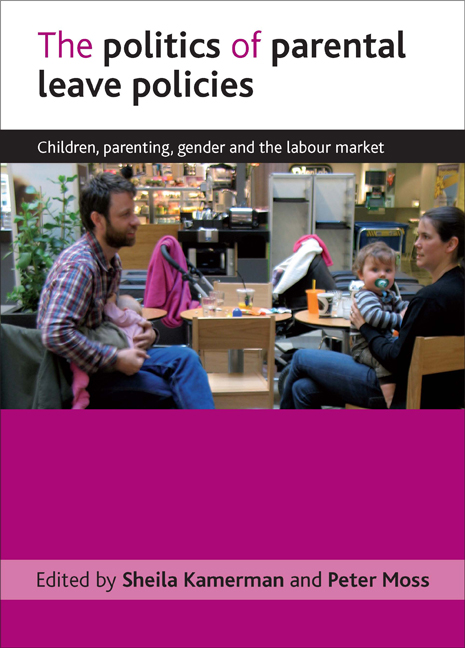Book contents
- Frontmatter
- Contents
- List of tables and figures
- Acknowledgements
- Notes on contributors
- one Introduction
- two Australia: the difficult birth of paid maternity leave
- three Canada and Québec: two policies, one country
- four Czech Republic: normative or choice-oriented system?
- five Estonia: halfway from the Soviet Union to the Nordic countries
- six Finland: negotiating tripartite compromises
- seven France: gender equality a pipe dream?
- eight Germany: taking a Nordic turn?
- nine Hungary and Slovenia: long leave or short?
- ten Iceland: from reluctance to fast-track engineering
- eleven The Netherlands: bridging labour and care
- twelve Norway: the making of the father’s quota
- thirteen Portugal and Spain: two pathways in Southern Europe
- fourteen Sweden: individualisation or free choice in parental leave?
- fifteen The European directive: making supra-national parental leave policy
- sixteen Conclusion
- Appendix
- Index
four - Czech Republic: normative or choice-oriented system?
Published online by Cambridge University Press: 05 July 2022
- Frontmatter
- Contents
- List of tables and figures
- Acknowledgements
- Notes on contributors
- one Introduction
- two Australia: the difficult birth of paid maternity leave
- three Canada and Québec: two policies, one country
- four Czech Republic: normative or choice-oriented system?
- five Estonia: halfway from the Soviet Union to the Nordic countries
- six Finland: negotiating tripartite compromises
- seven France: gender equality a pipe dream?
- eight Germany: taking a Nordic turn?
- nine Hungary and Slovenia: long leave or short?
- ten Iceland: from reluctance to fast-track engineering
- eleven The Netherlands: bridging labour and care
- twelve Norway: the making of the father’s quota
- thirteen Portugal and Spain: two pathways in Southern Europe
- fourteen Sweden: individualisation or free choice in parental leave?
- fifteen The European directive: making supra-national parental leave policy
- sixteen Conclusion
- Appendix
- Index
Summary
Maternity leave: 28 weeks at 69% of daily earnings up to a ceiling of CZK479 per day.
Paternity leave: none.
Parental leave: until child is 3 years; leave is an individual entitlement but only one parent can receive parental benefit. There are 3 options for benefit payment: CZK11,400 (€400) per month until the child is 24 months; or CZK7,600 (€265) until the child is 36 months; or CZK7,600 until the child is 21 months, then CZK3,800 (€135) until the child is 48 months.
Leave to care for sick children: 9 days per parent per illness of a child under 10 years at 69% of earnings up to a ceiling of CZK441 (€15) per day; there is no limit on the frequency of taking leave.
Other: none.
The Czech Republic is a member state of the European Union (EU). It became an independent state in 1993 after Czechoslovakia separated into two states. It has a low level of employment among women with children under 3 years and a low level of part-time employment among women workers. There is no information on how much time women or men take for parental leave, but the number of men taking leave is very low; in 2006, men accounted for 1.4% of recipients of parental benefit. There is a very low level of formal childcare provision for children under 3 years.
Introduction
Until 1992, the Czech Republic was a part of Czechoslovakia. Czechs and Slovaks shared the whole communist period as one country, as well as the onset of the fundamental economic and social changes that followed the collapse of this regime. The period of common history is taken only as the starting point for the main focus of the chapter: an analysis of policies in the Czech Republic since 1993. The pronatalist population policy practised before 1990 in Czechoslovakia is contrasted with the development of family policy after 1990.
The chapter is divided into two sections. The first is historically organised and consists of several parts reflecting the changes on the Czech political scene up to 2008. Developments in maternal and paternal leave policies are systematically presented; paternity leave has not so far been established in the Czech Republic. The second section is devoted to discussion of cross-cutting issues related to leave policy: work, fertility and gender.
- Type
- Chapter
- Information
- The Politics of Parental Leave PoliciesChildren, Parenting, Gender and the Labour Market, pp. 51 - 68Publisher: Bristol University PressPrint publication year: 2009



